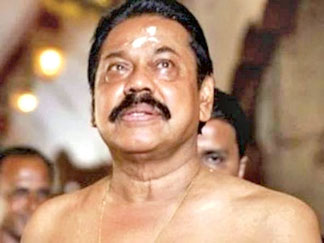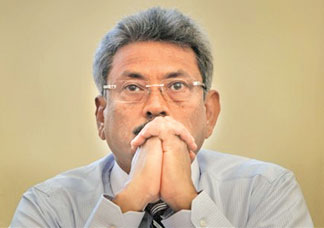Unravelling Mahinda
Why did The Australian's Greg Sheridan fail to investigate the war
crimes of former Sri Lankan president, Mahinda Rajapaksa? When prominent
journalists choose a path of cosy promotion rather than rigorous
investigation, we are all in trouble, writes Trevor Grant.
 |
|
Former president, Mahinda
Rajapaksa when he visited a Hindu temple during his tenure as
President Pic: Courtesy Colombo
telepraph |
When a government is engaged in the grubby business of trying to
launder the blood-drenched image of an accused war criminal and people
smuggler as well as an accused child murderer who became an alleged
gun-runner for Islamist terrorists, it's always handy to have a national
newspaper to assist with the task.
Such was the good fortune of the Australian Government when The
Australian and its foreign editor, Greg Sheridan, stepped up to the
plate in August, 2013 and accepted an all-expenses paid trip to Sri
Lanka to interview its then president Mahinda Rajapaksa and his brother,
Gotabhaya, the then Defence Secretary.
It was perfect timing for Australia's Labour Government, which was
trying to convince Australians that Sri Lanka was a land of peace and
serenity, in order to justify its deal with Rajapaksa to return Tamil
asylum-seekers who had fled the persecution he was exacting upon them.
Returning asylum seekers
The Rajapaksas' reputation for brutality was well-documented and
widely-known at the time. It included UN reports detailing allegedly
pre-meditated slaughter of up to 70,000 Tamil civilians in 2009 in the
closing days of the country's civil war and the post-war torture, rape
and disappearance of Tamils in secret prisons.
This was also not news to the Australian Government at the time.
Under then Foreign Affairs Minister, Bob Carr, Australia had demanded of
Sri Lanka at the UN Human Rights Council in late 2012 that it desist
from "torturing and disappearing" its own citizens. Yet, Carr repeatedly
said publicly, it was a safe place to return asylum-seekers; people
regularly described as 'traitors' by Mahinda Rajapaksa.
What the Australian Government also knew at this time was that the
President wasn't being entirely upfront when he told Carr and others
about his eagerness to stop asylum-seekers from leaving the country.
Some sections of the Australian media were beginning to let the cat out
of the bag with stories indicating the Rajapaksa clan was benefittng out
of boatloads of fleeing Tamils who had naval assistance to depart Sri
Lankan waters.
The Australian reported in early 2013 that Australia's intelligence
agencies had identified a link between Rajapaksas and people-smuggling
activities. This came less than two months after Carr had gone to
Colombo to announce a 'four-point plan' to fight people-smuggling and
take part in the inaugural 'joint working group on people smuggling and
transnational crime,' chaired by Defence Secretary Gotabaya Rajapaksa.
Yet, while Australia's only national broadsheet may have been
reporting on this serious conflict in Australian foreign policy, its
most senior foreign correspondent was clearly uninterested.
Blurred Australian Foreign policy
 |
|
Pic: Courtesy a Tamil
daily |
|
Now the man
whom Sheridan described as a national hero has been banned from
leaving the country by a court while investigations continue on
his alleged links to gun-running |
A few months later, he was in Colombo as Rajapaksa's paid guest,
rattling off no less than 5,000 words of unqualified praise for his
hosts that made no mention of the fact that Rajapaksa had been outed as
a possible people smuggler in his own newspaper. Sheridan chose another
course, quoting Rajapaksa as saying international sympathisers of the
defeated Tamil Tigers were 'deeply-involved' in the people smuggling,
from Sri Lanka to Australia. Sheridan, who produced no evidence to
support this claim, happily added his imprimatur to it, writing that
another statement by the Sri Lankan navy commander, Vice-Admiral
Jayanath Colombage that unidentified Tamil Tiger 'networks' were
responsible for people-smuggling on the island was *"controversial but
makes sense."
Sheridan also did not refer to the fact that Rajapaksa, as ultimate
Commander of the Army, faced war crimes allegations in a UN report,
saying only that the president denied that the army needlessly killed
civilians in the final days of the war.
Sheridan might have overlooked a lot of key points but he did pick up
on the Australian angle with Colombage, saying the Sri Lankan commander
and the Australian Chief of Navy, Vice-Admiral Ray Griggs were friends.
"Our wives are also friends," he quoted Colombage as saying.
"Like all old sailors" wrote Sheridan, "Colombage, is a mine of
fascinating tales." One tale he didn't tell him, though, was that the
Navy was about to take the fall for Rajapaksa. Indeed, only two months
after Sheridan's puff pieces appeared, the new Australian Foreign
Minister, Julie Bishop, was "welcoming" the arrests of Navy sailors,
including a senior commander, for people-smuggling. Lieutenant Commander
Sanjeewa Annatugoda told Fairfax media from his prison cell: "I am not
the man who did this thing. Others did."
Human smuggling
Recently, the new Sri Lankan Prime Minister, Ranil Wickremesinghe,
made it clear it wasn't the responsibility of a down-the-line naval
commander, or Tamil Tiger networks, when he publicly linked the
Rajapaksa regime with people-smuggling operations and said the
Australian Government had remained silent on Sri Lanka's human rights
abuses to get Rajapaksa's co-operation on stopping asylum-seeker boats.
The irony was unmissable when Sheridan's newspaper became one of the
first media outlets to report this statement.
Today, as the sinister workings of the Rajapaksa cabal are being
exposed by a new Sri Lankan government - including startling allegations
of gun-running by Gotabaya Rajapaksa to Islamist terrorist groups -
Sheridan's portrayal of the regime is a serious embarrassment to one of
Australia's most influential journalists.
The accusations of corruption and other heinous crimes against the
Rajapaksa clan are not new. They had been widely-aired for some time
before Sheridan accepted money from the Sri Lankan Government to
interview the president in 2013.
Sheridan's glowing tribute to Gotabhaya Rajapaksa included such
lavish phrases as "Gota is a national hero in Sri Lanka and his office
is crisply military. He is sharp and precise and very business-like."
What he failed to mention was that Gotabhaya Rajapaksa, according to
so many credible reports, was also extremely sharp and precise in the
business of violating rights of innocent people. He was a central figure
in the war crimes charges that were levelled by the UN as far back as
2011 and are now the subject of a UN investigation. And he was accused
of ordering the execution of the 12-year-old son of the Tamil Tigers
leader, Velupillai Prabhakaran.
In 2012, the Sri Lankan media first reported Gotabhaya Rajapaksa's
alleged instruction to shoot the boy who had been captured by the Army
and was later seen in photographs dead on the ground outside a bunker,
with five bullet holes in his chest. Yet, Sheridan chose not to address
any of this in his story. Now the man whom Sheridan described as a
national hero has been banned from leaving the country by a court while
investigations continue into his alleged links to gun-running.
Private security company
The BBC reported in March that police had discovered a boatload of
more than 3000 weapons, including machine guns, in the hands of a
private security company set up by Gotabaya Rajapaksa. Sri Lankan media
reported that the Criminal Investigation Division (CID) had information
that he was making millions of dollars from selling arms to terrorist
groups and sea pirates. The 'Colombo Telegraph' reported that Interpol
was involved in the investigation and the Nigerian Government was
investigating whether any of these weapons had gone to terrorist group,
Boko Haram.
Gotabhaya Rajapaksa's rap sheet grows by the day, courtesy of former
allies who are now all too willing to spill the beans. According to
former minister, Mervyn Silva and an ex-police spokesman Prisantha
Jayakody, he was responsible for the notorious white van abductions in
which thousands of young Tamil men were picked up off the streets and
disappeared into a jail system where torture and rape are commonplace.
Silva also said he and his brother, Basil, the former minister for
economic development, was behind the murder of high-profile journalist,
Lasantha Wickremetunge.
Gotabhaya's brother, Mahinda, was well aware of these crimes, and
sanctioned them, according to Silva.
As government investigations into the Rajapaksa regime continue, new
accusations are surfacing on a regular basis.
Sri Lankan media reported recently that Sri Lanka's former Ambassador
to Russia, Udayanga Weeratunga, has been accused by the Ukrainian
Government of involvement in arms sales to separatist fighters in
Ukraine. Weeratunga is a nephew of Mahinda Rajapaksa, and one of scores
of extended family members who occupied government positions.
Last month, Basil Rajapaksa was arrested and brought before a
magistrate to face charges of fraud over public housing constructions.
He denied the charges. Big brother, Mahinda, has also been accused of
widespread corruption as well as trying to organize a military coup to
block Sirisena's victory over him on the night of the election. He has
denied all accusations against him, as has Gotabaya.
Of course, the revelations that are coming from the new Government
are tinged with hypocrisy, given that the new president, Maithripala
Sirisena, served in Rajapaksa's Cabinet for 10 years. He was acting
Defence Minister when thousands of Tamils were deliberately murdered by
the Army and sits high in the chain of command being investigated by the
UN for war crimes.
He was cheering on Rajapaksa as the military jailed, tortured and
raped Tamils in the North and the East; when he banned the UN
investigators from the country and as he built his private fortune
through corrupt dealings with Chinese and other foreign investors in new
projects in the country. It was allowed to happen because foreign powers
have no interest in exposing the truth.
As China builds its presence in the Indian Ocean region, it wants a
slice of this strategically-placed island. The US and India want to push
back against this new threat. And Australia wanted an agreement to stop
boats.
The end result is a policy of willful blindness to oppression,
corruption, torture, rape and murder. It's all okay as long as everyone
gets what they want. The one thing that doesn't count is doing what is
right for the people of Sri Lanka. In such circumstances, a democracy
relies heavily on the fourth estate to bring us the truth. But when
prominent journalists such as Greg Sheridan choose a path of cosy
promotion rather than rigorous investigation, we are all in trouble.
Trevor Grant is the author of 'Sri Lanka's Secrets: How The Rajapaksa
Regime Gets Away With Murder', published by Monash University
Publishing, Australia, 2014. This article was originally published in
independentaustralia.net |

